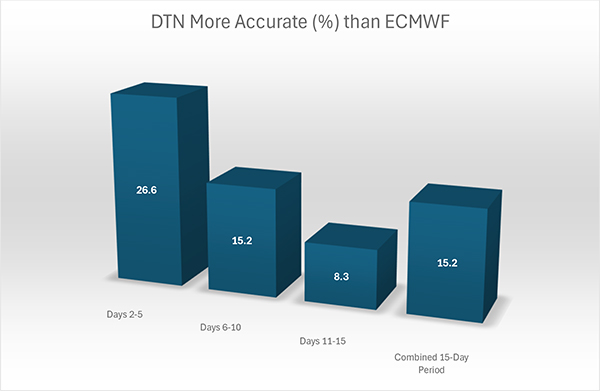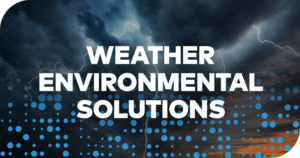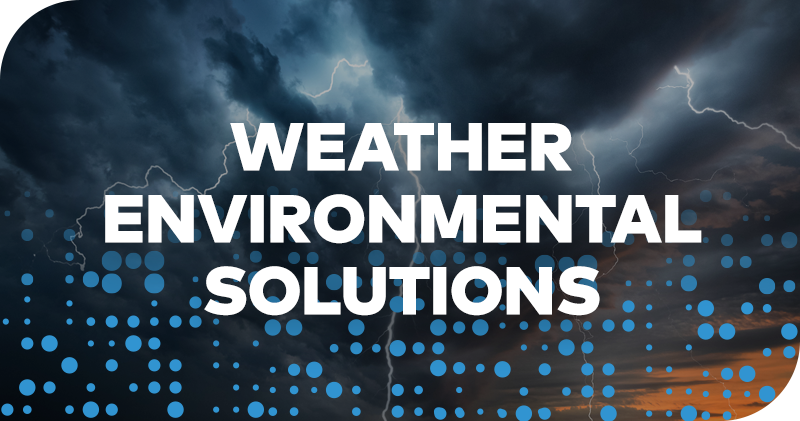DTN Forecast System: Precision Weather Intel for Smart Decisions

The DTN Forecast System delivers unparalleled weather forecast accuracy through advanced modeling, machine learning, and blending techniques. It provides real-time updates and customizable alerts to help businesses stay ahead of changing conditions. With industry-specific insights across over 280 parameters, DTN transforms raw weather data into actionable intelligence tailored to operational needs. This cutting-edge system empowers informed decision-making, enabling users to navigate weather-dependent operations proactively.
DTN Forecast System highlights
Multiple Data Inputs incorporate observational data, multiple numerical weather prediction models, radar, satellite data, and DTN proprietary models.
Advanced statistical techniques deliver statistical comparisons and machine learning to blend multiple forecast sources, emphasizing the most accurate predictions.
Global coverage that provides forecasts for any location worldwide eliminating the need for location-specific configuration.
Scalable cloud infrastructure which utilizes Amazon Web Services for reliable, redundant, and scalable computing power to handle complex weather modeling tasks.
Continuous updates including forecasts updated frequently as new data becomes available, rather than on a fixed schedule, ensuring the most up-to-date predictions.
Long-range forecasts produces hourly forecasts out to 360 hours (15 days) ahead.
Extensive verification that undergoes rigorous accuracy testing through partnerships with third-party vendors as well as internal verification processes.
Accuracy and reliability are the foundation of confident decision-making
The DTN Forecast System leverages an advanced ensemble approach, incorporating data from multiple global and regional weather models. Using machine learning algorithms, the system constantly evaluates and scores model performance, ensuring optimal forecasting across various locations and times. It employs a sophisticated blending technique for optimal model selection, downscaling techniques for precise location-specific predictions, and undergoes extensive third-party verification for continuous improvement.
This advanced blended approach yields more accurate forecasts than any of the individual models it comprises. As illustrated in the graph below, the DTN Forecast System demonstrates consistently superior performance compared to the ECMWF ENS forecasts across all time periods. For the short-term forecast horizon of Days 2-5, DTN exhibits a 27% higher accuracy, highlighting its strength in short-term forecasting. As the forecast horizon extends to Days 6-10, its accuracy advantage narrows but remains significant at 15%. With critical decisions often made during this time horizon, accuracy is paramount. By Days 11-15, the difference remains notable, with DTN forecasts 8% more accurate. Across the combined 15-day period, the DTN Forecast System maintains an average accuracy improvement of 15%, highlighting its ability to provide more reliable forecasts over both short- and medium-term periods, while also being a valuable tool for longer-range planning.

DTN Forecast System accuracy increase over ECMWF Global Ensemble by Time Period
Forecast Verification Summary Mean Absolute Error (MAE) for the Last 90 Days for 300+ US Cities
Timeliness and real-time updates: staying ahead of changing conditions
The system excels in providing timely and real-time updates, ensuring users always have access to the most current weather intelligence. Its cloud-based architecture allows for automatic scaling and rapid processing, while an hourly update cycle incorporates real-time observations. Customizable alerts for critical weather thresholds or events enable users to anticipate and respond to changing conditions effectively, transforming the system into a dynamic decision support tool.
Industry-specific insights: tailored intelligence for targeted decision-making
The DTN Forecast System goes beyond generic weather forecasts by providing industry-specific insights that directly inform operational decisions. It offers tailored parameters for various industries such as agriculture, energy, and transportation, with over 280 different forecast parameters, including probabilistic forecasts. The system seamlessly integrates with existing workflows and systems, transforming raw weather data into actionable insights and allowing organizations to move from reactive weather management to initiative-taking strategies.
Conclusion
The DTN Forecast System represents a significant advancement in weather intelligence. By delivering unparalleled accuracy and reliability, timely and real-time updates, and industry-specific insights, it empowers users across various sectors to make informed decisions in the face of ever-changing weather conditions. As climate variability increases and the need for precise weather intelligence grows, systems like DTN has developed will play an increasingly crucial role in helping organizations navigate weather-dependent operations. With the DTN Forecast System, users gain not just a weather forecast, but a powerful tool for strategic decision-making and operational excellence.
Learn more about accessing DTN weather data through our seamless API integrations.











 Comprehensive weather insights help safeguard your operations and drive confident decisions to make everyday mining operations as safe and efficient as possible.
Comprehensive weather insights help safeguard your operations and drive confident decisions to make everyday mining operations as safe and efficient as possible. Learn how to optimize operations with credible weather and environmental intelligence. From aviation safety to environmental compliance, our comprehensive suite of solutions delivers real-time insights, advanced forecasting, and precise monitoring capabilities.
Learn how to optimize operations with credible weather and environmental intelligence. From aviation safety to environmental compliance, our comprehensive suite of solutions delivers real-time insights, advanced forecasting, and precise monitoring capabilities. 

